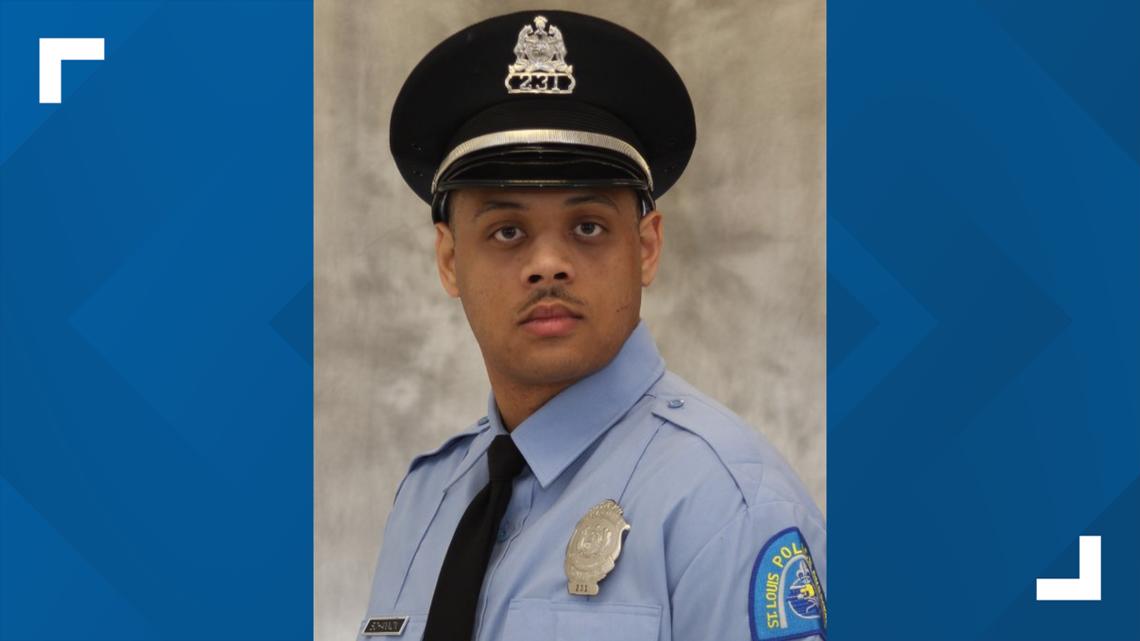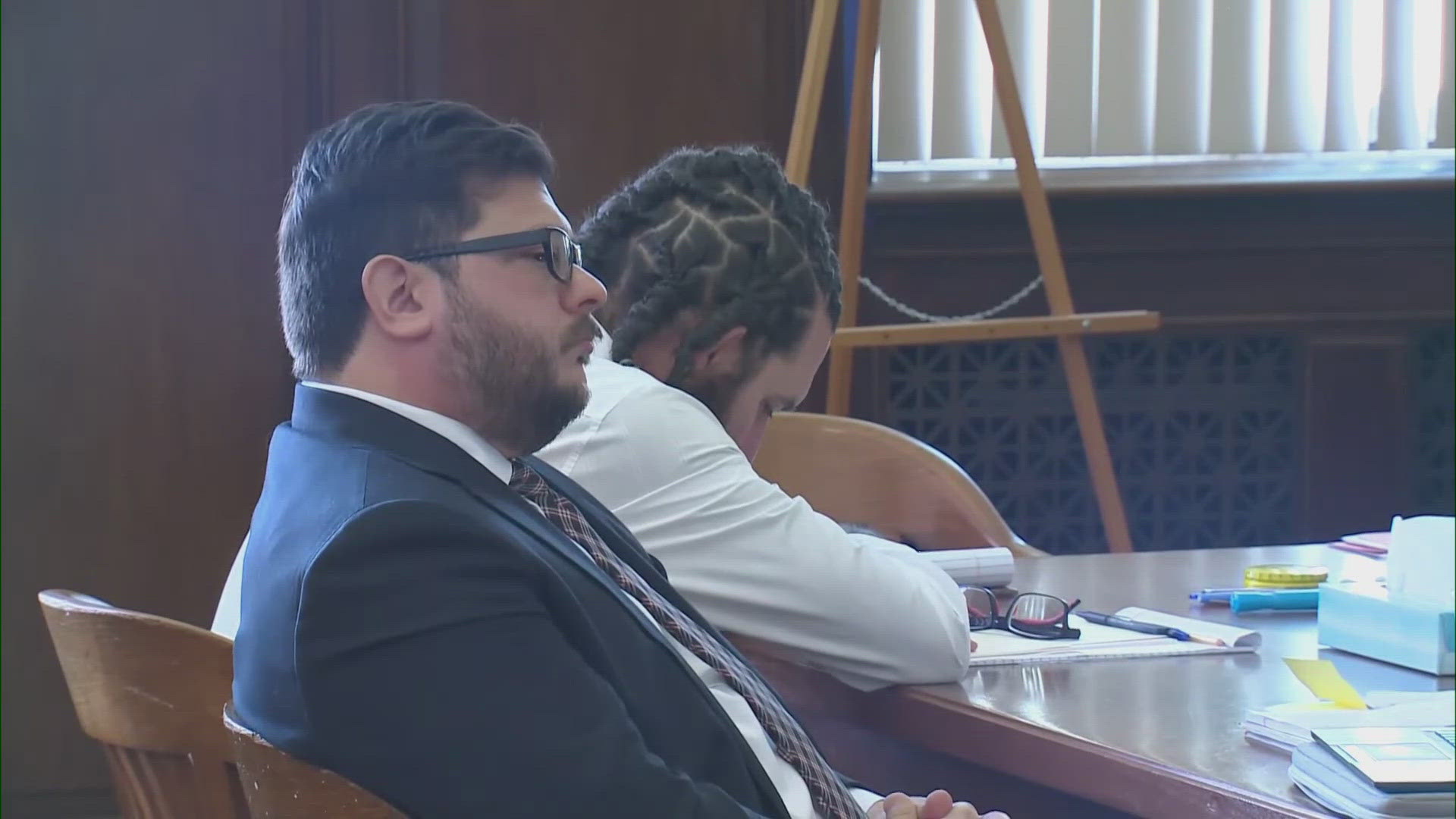ST. LOUIS — Thomas Kinworthy’s attorneys admitted in their opening statement Monday that their client killed a St. Louis police officer, wounded another officer and shot a homeless man – but they told jurors he shouldn’t go to prison for it.
St. Louis Police Officer Tamarris Bohannon was 29 years old and a married father of three children all younger than 10 when he was killed in August 2020.
Police said Kinworthy first shot a homeless man in the alley in the 3700 block of Hartford Street in the Tower Grove South neighborhood before forcing a couple to leave their home at gunpoint and opening fire on responding officers. He’s facing multiple charges, including first-degree murder.
Assistant Circuit Attorney Tanja Engelhardt described how calm the neighborhood was before Kinworthy, "a vicious tornado," came through.
Assistant Public Defender Anne Rusk Legomsky, gave the opening statement for the defense, and asked jurors to find Kinworthy not guilty by reason of mental defect.
“They were the actions of a man who was not in his right mind, they were the actions of a man suffering from mental illness,” Legomsky said.
She told the jury they would be hearing from two experts who have diagnosed Kinworthy with schizoaffective disorder, which can bring extreme mood changes from deep depression with sleeping for days without showering or eating to manic almost hyperactive periods of days without sleeping.
Patients also describe hearing voices as well as experiencing hallucinations, Legomsky said.
Legomsky told jurors her client fired multiple shots at the walls inside the bathroom of the home where he hid from police because he believed people were coming through the walls.
She said he called his ex-wife twice on the day in question, once before the shooting and once afterwards telling her someone was trying to get him and he didn’t know why.
“I’m going to tell you something that the defense doesn’t normally say in an opening statement,” Legomsky began. “We admit it.
“We admit that Tommy did the things that night. What happened that night is simply not in dispute.
“What we’re here for is why it happened.”
Kinworthy began to rock in his seat as she told the jury about the abusive childhood he suffered at the hands of both of his parents, saying he suffered “every kind of abuse you can imagine.” She said he had just seen his father after years of no contact with him on the day of the shooting.
St. Louis Circuit Attorney Gabe Gore’s office also had an expert conduct a mental health evaluation, which disputed the two opinions about schizoaffective disorder that the defense plans to present.
Kinworthy's attorneys told jurors the prosecution's expert didn't spend nearly as much time with Kinworthy as the other two forensic psychiatrists -- one of whom was not paid by the defense for an opinion, but is simply his treating mental health physician.
The not guilty by reason of mental defect plea has a high bar, and is somewhat uncommon, according to Anders Walker, a law professor at St. Louis University.
“Very few people qualify for the insanity defense, and most defendants go to trial without any evaluation of their mental state,” Walker said. “The defense itself is very narrow.”
Walker said states limited the defense after John Hinckley shot former President Ronald Regan in 1981, saying he did it to impress actress Jodi Foster. His attorneys argued he was delusional, and he spent 30 years in a mental institution, and has since been freed.
“(The insanity defense) is really for people who hear defect decrees, these are parents who sometimes say they hear God telling them to kill their children and this rarely happens,” Walker said.
Alexis Bohannon was the first witness prosecutors called to the stand.
Legomsky objected each time prosecutors asked to enter pictures of Bohannon into the court record, questioning their relevance. One showed Bohannon wearing a sombrero on his birthday. And another showed him dressed in a suit. Judge Elizabeth Hogan overruled the objections.
Bohannon described her husband of eight years, and partner since she was 14 as a “big guy, with a big heart.” She also described making the decision to remove him from life support when he started having multiple seizures following surgery to relieve swelling on his brain. He was shot once in the head.


She then wept when prosecutors showed her a picture of Bohannon taken shortly after he died. Others in the courtroom gallery wiped tears from their eyes. Prosecutors ended their questioning. Kinworthy’s attorneys declined to question her, and she was excused from the stand.
The prosecution then called the homeowner to the stand. She recalled how Kinworthy allegedly showed up at her front door shortly after shooting the homeless man in the alley who the neighborhood knew as harmless and who would sometimes dig into trash bins for recyclables.
She said she and her husband quickly walked out of their back door after Kinworthy told them to hang up their phone, as they had just called 911.
The case almost went to trial in January, but the lead prosecutor on the case got sick and the trial was rescheduled for this week. During that jury selection, Kinworthy rocked in his chair, his eyes frequently darted around the room, he talked to his attorneys and himself at times. His had shoulder length braids in his hair that swayed as he rocked.
On Monday, he wore his hair in braids that were pulled back and only rocked as his attorneys described his mental health diagnosis and traumatic childhood.
The trial is scheduled to last until May 3.
In 2022, Alexis Bohannon told 5 On Your Side she was frustrated with how long the case was taking to get to court during the previous administration.
She said then that her children, Tamara, 14, Ayden and Tylor, now both 10, had it hanging over them for too long.
“It slows down our family’s process of healing,” she said in 2022. “Whether he spends the rest of his life in prison or whether he spends the rest of his life in a mental health institution makes me no mind.
“As long as he's not on the streets, as long as he can't perpetrate again, as long as he won't kill another soul in his life, I will be perfectly happy with it.”

